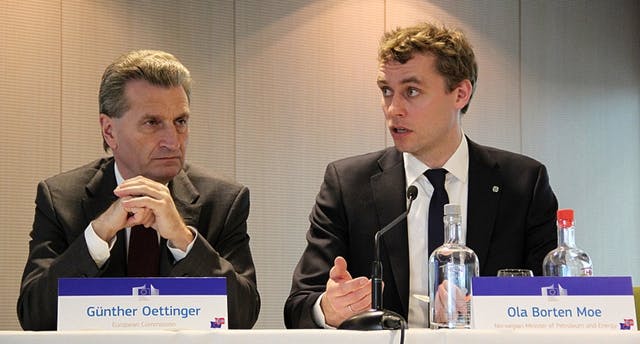How to sell more Norwegian gas to Europe
A tricky question to solve, even at a Brussels seminar.

Oettinger and Borten Moe talking gas (photo: Lars-Erik Hauge/Norway Mission to the EU)
The EU-Norway natural gas seminar held in Brussels on 5th March did not solve the question it purported to address: how to sell more Norwegian gas to Europe while enabling the EU to reduce carbon emissions. But that was always a bit of a long shot, especially in the home of Eurocracy and innumerable think-tanks and consultancies advocating this and that.
The majority of the participants were Norwegians – unusual in this town where most conference-goers tend to be EU nationals looking for further EU «resources» (free money to you and me) – but the bulk of the interventions from the floor came from representatives of various obscure but well-funded organisations with an interest in promoting renewables.
It was also notable that in contrast to gas conferences of say, 10-15 years ago, when many of the panellists would have been British energy traders advocating the adoption of free market policies, many of the current panel were British policy wonks advocating further subsidies for renewables. In other words, public discussion of the energy industry is now dominated by Brits who do not depend for their living on actually buying and selling the stuff.

Norway’s energy minister Ola Borten Moe did not mince his words: Norway wants to supply the EU with as much gas as it can – up to 150 bcm/yr, but is unable to plan future investments because the EU is failing to implement its own Emissions Trading Scheme. As a result gas is pushed down the generation merit order and more coal is burned, especially cheap American coal dumped out of the US by even cheaper shale gas.
Statoil’s Rune Bjørnson – a man whose job unquestionably depends on producing and selling gas – pointed out that since 2005 the EU has adopted more than 20 climate policy initiatives and an astonishing 50 energy policy initiatives. Within the individual member states of the EU there are increasingly diverse energy policies, and a decreasing reliance on market-based solutions. He warned that the EU is heading for a situation where it raises its costs without significantly cutting carbon emissions.
EU Energy Commissioner Gunther Oettinger made a good politician’s speech, but failed to carry his audience when he refused to consider reform of the ETS.
At the end of the day the Norwegians were in an all-too familiar position: knowing much more about the gas industry, its problems and its promise, than the people they were talking to.
And the car crash of European climate change and energy policies continues to spread debris across the landscape.